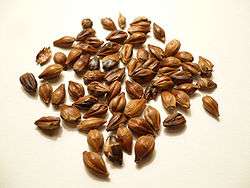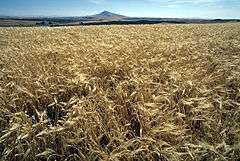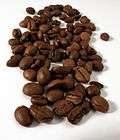Barley tea
| Barley tea | |
|---|---|
.jpg) | |
| Type | Herbal tea |
|
| |
| Other names |
|
| Origin | East Asia |
|
| |
| Quick description | Tea made from roasted barley |
|
| |
| Temperature | 100 °C (212 °F) |
| Time | 5‒10 minutes |
| Barley tea | |||||||||
| Chinese name | |||||||||
|---|---|---|---|---|---|---|---|---|---|
| Traditional Chinese | 大麥茶 | ||||||||
| Simplified Chinese | 大麦茶 | ||||||||
| Literal meaning | barley tea | ||||||||
| |||||||||
| Korean name | |||||||||
| Hangul | 보리차 | ||||||||
| Literal meaning | barley tea | ||||||||
| |||||||||
| Japanese name | |||||||||
| Kanji | 麦茶 | ||||||||
| Kana | むぎちゃ | ||||||||
| |||||||||
Barley tea is a roasted-grain-based infusion made from barley which is a staple across Korea, China, and Japan.[1] It has a toasty flavor, with slight bitter undertones.[2][1]
In Korea, the tea is consumed either hot or cold, often taking the place of drinking water in many homes and restaurants.[3][4] In Japan, it is usually served cold and is a popular summertime refreshment.[5] The tea is also widely available in tea bags or bottled in Korea and Japan.[4][5]
Names
In China, barley tea is called dàmài-chá (大麦茶; 大麥茶) or mài-chá (麦茶; 麥茶), in which dàmài (大麦; 大麥) or mài (麦; 麥) means "barley" and chá (茶) means "tea".
In Japan, barley tea is called mugi-cha (麦茶; むぎちゃ), which shares the same Chinese characters as Chinese mài-chá (麦茶; 麥茶), or mugi-yu (麦湯; むぎゆ), in which yu (湯; ゆ) also means "tea".
In Korea, barley tea is called bori-cha (보리차), in which the native Korean bori (보리) means "barley" and Sino-Korean cha (차; 茶) shares the same Chinese character meaning "tea".
Preparation
The tea can be prepared by boiling roasted unhulled barley kernels in water or brewing roasted and ground barley in hot water. In Japan, tea bags containing ground barley became more popular than the traditional barley kernels during the early 1980s and remain the norm today.
 Roasted barley grains
Roasted barley grains A tea bag for a jar of barley tea
A tea bag for a jar of barley tea
Bottled tea
Bottled barley tea is sold at supermarkets, convenience stores, and in vending machines in Japan and Korea. Sold mostly in PET bottles, cold barley tea is a very popular summertime drink in Japan.[5] In Korea, hot barley tea in heat-resistant PET bottles is also found in vending machines and in heated cabinets in convenience stores.[6]
Blended barley teas and similar teas
In Korea, roasted barley is also often combined with roasted corn, as the corn's sweetness offsets the slightly bitter flavor of the barley. The tea made from roasted corn is called oksusu-cha (corn tea), and the tea made from roasted corn and roasted barley is called oksusu-bori-cha (corn barley tea). Several similar drinks made from roasted grains include: hyeonmi-cha (brown rice tea), gyeolmyeongja-cha (sicklepod seed tea), and memil-cha (buckwheat tea).
Roasted barley tea, sold in ground form and sometimes combined with chicory or other ingredients, is also sold as a coffee substitute.[7]
See also
References
- 1 2 Lee, J. (4 January 2016). "5 winter warmers that are caffeine-free". Christian Today. Retrieved 31 January 2017.
- ↑ Allan, M. Carrie; Allan, M. Carrie (22 May 2016). "What's better than a tall glass of iced tea? One with booze stirred in". The Washington Post. Retrieved 31 January 2017.
- ↑ De Mente, Boyé Lafayette (2012). The Korean mind : understanding contemporary Korean culture. Tokyo: Tuttle Pub. p. 420. ISBN 978-0-8048-4271-6. Retrieved 21 December 2017.
- 1 2 Won, Ho-jung (22 April 2016). "[Weekender] Healthful Korean tea to fit every need". The Korea Herald. Retrieved 31 January 2017.
- 1 2 3 Beseel, Casey (16 July 2015). "Japan's barley soda is so weird in so many ways, yet so right in one 【Taste test】". RocketNews24. Retrieved 31 January 2017.
- ↑ 이, 주현 (28 November 2016). "웅진식품, '하늘보리' 온장 제품 출시…동절기 포트폴리오 강화" [Woongjin Food launches hot 'Haneul Bori', augmenting winter portfolio]. The Asia Economy Daily (in Korean). Retrieved 3 February 2017.
- ↑ Maier, H. G. (1987). "Coffee Substitutes Made from Cereals". In Clarke, R.J.; Macrae, R. Coffee: Related Beverages. pp. 5–8. ISBN 978-1-85166-103-9.

